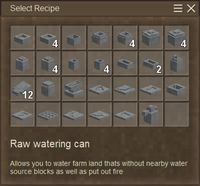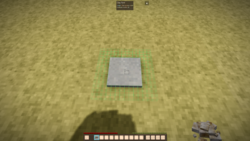Clay forming/es: Difference between revisions
No edit summary |
(Created page with "=== Modos del pincel de arcilla === Para cambiar el número de vóxeles de arcilla añadidos o eliminados (1x1, 2x2 y 3x3), pulsa F y selecciona el "tamaño del pincel" que indican las tres primeras opciones del menú. La última opción del menú de herramientas, "Copiar", permite al jugador duplicar capas idénticas de vóxeles de arcilla. Cuando se selecciona esta opción del menú, se {{using|añade}} una "capa" de arcilla que coincidirá con el patrón de voxels dir...") |
||
| Line 22: | Line 22: | ||
[[File:Clay_molding.png|right|thumb|250px]] | [[File:Clay_molding.png|right|thumb|250px]] | ||
=== | === Modos del pincel de arcilla === | ||
Para cambiar el número de vóxeles de arcilla añadidos o eliminados (1x1, 2x2 y 3x3), pulsa F y selecciona el "tamaño del pincel" que indican las tres primeras opciones del menú. La última opción del menú de herramientas, "Copiar", permite al jugador duplicar capas idénticas de vóxeles de arcilla. Cuando se selecciona esta opción del menú, se {{using|añade}} una "capa" de arcilla que coincidirá con el patrón de voxels directamente debajo de la capa actual "en construcción". | |||
=== Clay Oven === | === Clay Oven === | ||
Revision as of 16:38, 28 December 2022
La formación de arcilla es un método de creación que permite al jugador colocar pequeños cubos (vóxeles) de arcilla en capas que forman un recipiente, que luego se cuece en un horno de foso para terminar el objeto. La mecánica de modelado es similar a la de las herramientas de piedra, en la que hay que añadir o quitar vóxeles para crear el objeto deseado.
Materiales requeridos
Para formar objetos de arcilla, el jugador necesita arcilla azul o arcilla de fuego, así como hierba seca, palos y leña para un horno de foso.
Obteniendo arcilla
Los depósitos de arcilla suelen encontrarse en climas templados y pueden recogerse con las manos desnudas o con una pala. Existen diferentes tipos de arcilla en el mundo, la arcilla azul y la arcilla de fuego. Para moldes de herramientas y objetos como cuencos y ollas, se puede usar cualquiera de los dos tipos de arcilla, pero la horno bajo debe construirse con ladrillos de arcilla de fuego.
Formar moldes y objetos
- Seleccionar la arcilla en la mano libre.
- Apunta con el punto de mira blanco a una superficie sólida y abrir el menú de formación de arcilla y selecciona el objeto que quieras fabricar.
- La cuadrícula de formación de arcilla aparecerá en la superficie seleccionada. Para crear el molde u objeto elegido, los vóxeles de color "verde" se deben
rellenar y eliminar la arcilla de cualquier vóxel de color "naranja" para crear cada capa de la forma. A medida que se completa cada capa del objeto de arcilla, la siguiente capa aparecerá encima de la anterior. Es útil sentarse en el suelo (pulsar 'G') mientras se da forma a la arcilla.
Modos del pincel de arcilla
Para cambiar el número de vóxeles de arcilla añadidos o eliminados (1x1, 2x2 y 3x3), pulsa F y selecciona el "tamaño del pincel" que indican las tres primeras opciones del menú. La última opción del menú de herramientas, "Copiar", permite al jugador duplicar capas idénticas de vóxeles de arcilla. Cuando se selecciona esta opción del menú, se añade una "capa" de arcilla que coincidirá con el patrón de voxels directamente debajo de la capa actual "en construcción".
Clay Oven
See also Clay Oven.
This specific item can only be formed with fire clay, and requires a hefty amount of it. It can be used without firing afterwards, and is necessary for making good bread and pie.
Pit Kiln
Once the form is complete, the clay item must be baked in a pit kiln.
A pit kiln is a one deep hole dug into the earth or surrounded by non-flammable materials - make sure to not use any burnable materials in the vicinity, as the kiln will set fire to flammable material! Even tall grass and low hanging tree branches will go up in flames and might cause your local forest or house to be destroyed.
After finding a secure spot, place your raw items into the hole. You can find a list of how many items can be fired at the same time below. Next, place dry grass, sticks and firewood above the items in that order - the game will stop you from adding more than necessary. It should take 10 grass, 8 sticks and 4 firewood.
Finally, ignite the kiln with a torch or fire starter. Make sure to keep a safe distance from it yourself, since you can accidentally set yourself on fire as well. The firing will take approximately 20 ingame hours, so it's a good idea to prep the pit kiln before the night to let it fire away through the darkness. The fire on top of the kiln will stop burning when it's done, leaving only the finished pottery items in the hole. Finished items appear dark brown and no longer have "raw" in front of their name.
Following a list of clay items and how many of them can be fired in one pit kiln:
| Pottery Item | Amount |
|---|---|
| Bowl | 4 |
| Claypot | 4 |
| Crucible | 4 |
| Crock | 4 |
| Flowerpot | 4 |
| Planter | 1 |
| Shingle | 48 |
| Storage Vessel | 1 |
| Watering Can | 1 |
| Anvil Mold | 1 |
| Axe head Mold | 1 |
| Hammer head Mold | 1 |
| Hoe head Mold | 1 |
| Ingot Mold | 2 |
| Lamellae Mold | 1 |
| Pickaxe head Mold | 1 |
| Prospector's Pick Mold | 1 |
| Shovel head Mold | 1 |
| Sword blade Mold | 1 |
| Blue clay brick* | 12 |
| Fire clay brick** | 12 |
* can only be made using blue clay ** can only be made using fire clay
Using Finished Pottery Items and Molds
Many of the items made with clay are containers used in other types of crafting. Most baked items can be placed on the ground, and many pottery items can be picked up again with an empty hand.
Using Items
The Claypot and Bowls are used in Food and cooking, while the watering can has a use in farming. Crocks and Storage Vessels are containers used in food preservation. Shingles can be used to construct clay shingles blocks, Flowerpots and Planters are containers used in decorating. Lamellae are used as components in crafting armor
Using Molds
For more information and instructions when using molds to cast metal ingots, tools and weapons, see separate pages on: crucible, molds and casting.
Clay Required to Create Items and Molds
| Name | Item/Mold | Clay Required | Multiple? |
|---|---|---|---|
| Bowl | Item | 1, 4 | 1 or 4 |
| Cooking pot | Item | 4, 16 | 1 or 4 |
| Crucible | Item | 2, 13 | 1 or 4 |
| Crock | Item | 2, 14 | 1 or 4 |
| Flowerpot | Item | 4, 23 | 1 or 4 |
| Planter | Item | 18 | 1 |
| Shingles | Item | 7 | 12 |
| Storage Vessel | Item | 35 | 1 |
| Watering Can | Item | 10 | 1 |
| Anvil | Mold | 28 | 1 |
| Axe head | Mold | 11 | 1 |
| Hammer head | Mold | 12 | 1 |
| Hoe head | Mold | 12 | 1 |
| Ingot | Mold | 2, 5 | 1 or 2 |
| Lamellae | Mold | 8 | 1 |
| Pickaxe head | Mold | 12 | 1 |
| Prospector's Pick | Mold | 13 | 1 |
| Shovel head | Mold | 11 | 1 |
| Sword blade | Mold | 12 | 1 |
| Clay Oven* | Other | 69 | 1 |
* Does not need to be fired to function
Video Tutorials
| Explanation of clay firing v 1.15 | Alternative Explanation of clay firing since 1.15 |
|---|---|
| Wiki Navigation | |
|---|---|
| Vintage Story | Guías • Preguntas más frecuentes (FAQ) • Vintage Story Original Soundtrack • Versiones • Controles |
| Mecánicas de juego | Fabricación • Talla Lítica • Alfarería • Herrería • Cocina • Temperatura • Hambre • Minería • Estabilidad temporal • Energía mecánica • Comercio • Agricultura • Ganadería |
| Mundo | Generación del Mundo • Biomas • Clima • Tormentas temporales |
| Objetos | Herramientas • Armas • Armadura • Ropa • Mochilas • Materiales • Comida |
| Bloques | Terreno • Plantas • Decorativo • Iluminación • Functional • Minerales |
| Entidades | Entidades hostiles • Animales • NPCs • Jugadores |
| Miscellaneous | List of client commands • Lista de comandos del servidor • Creative Starter Guide • Bot System • Cómo utilizar Worldedit • Cinematic Camera • Adjustable FPS Video Recording • ServerBlockTicking |


